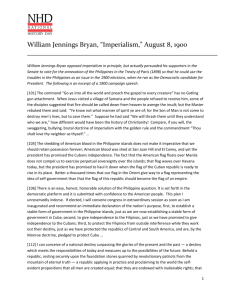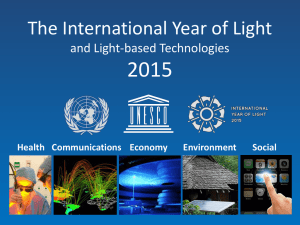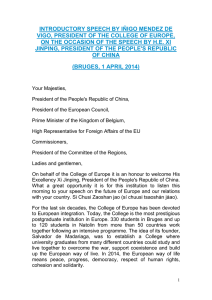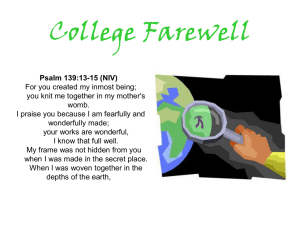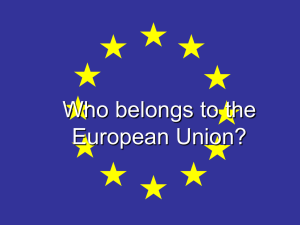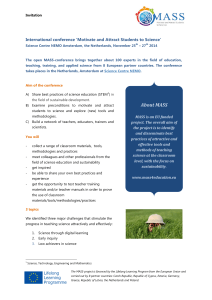8 - Arapahoe High School
advertisement
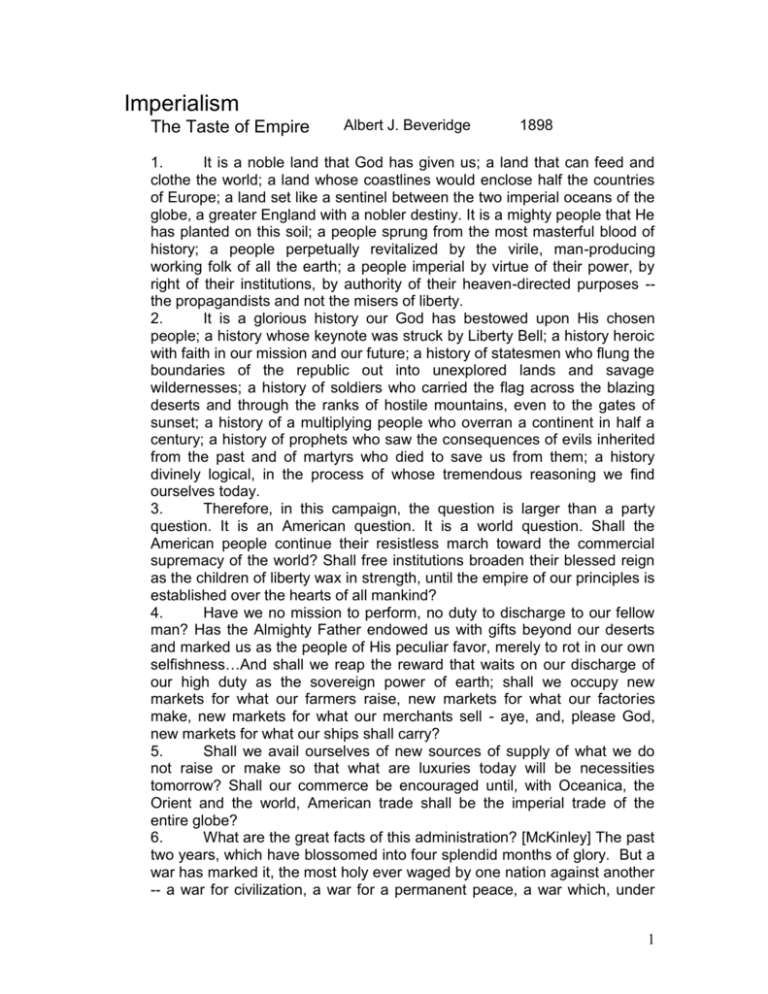
Imperialism The Taste of Empire Albert J. Beveridge 1898 1. It is a noble land that God has given us; a land that can feed and clothe the world; a land whose coastlines would enclose half the countries of Europe; a land set like a sentinel between the two imperial oceans of the globe, a greater England with a nobler destiny. It is a mighty people that He has planted on this soil; a people sprung from the most masterful blood of history; a people perpetually revitalized by the virile, man-producing working folk of all the earth; a people imperial by virtue of their power, by right of their institutions, by authority of their heaven-directed purposes -the propagandists and not the misers of liberty. 2. It is a glorious history our God has bestowed upon His chosen people; a history whose keynote was struck by Liberty Bell; a history heroic with faith in our mission and our future; a history of statesmen who flung the boundaries of the republic out into unexplored lands and savage wildernesses; a history of soldiers who carried the flag across the blazing deserts and through the ranks of hostile mountains, even to the gates of sunset; a history of a multiplying people who overran a continent in half a century; a history of prophets who saw the consequences of evils inherited from the past and of martyrs who died to save us from them; a history divinely logical, in the process of whose tremendous reasoning we find ourselves today. 3. Therefore, in this campaign, the question is larger than a party question. It is an American question. It is a world question. Shall the American people continue their resistless march toward the commercial supremacy of the world? Shall free institutions broaden their blessed reign as the children of liberty wax in strength, until the empire of our principles is established over the hearts of all mankind? 4. Have we no mission to perform, no duty to discharge to our fellow man? Has the Almighty Father endowed us with gifts beyond our deserts and marked us as the people of His peculiar favor, merely to rot in our own selfishness…And shall we reap the reward that waits on our discharge of our high duty as the sovereign power of earth; shall we occupy new markets for what our farmers raise, new markets for what our factories make, new markets for what our merchants sell - aye, and, please God, new markets for what our ships shall carry? 5. Shall we avail ourselves of new sources of supply of what we do not raise or make so that what are luxuries today will be necessities tomorrow? Shall our commerce be encouraged until, with Oceanica, the Orient and the world, American trade shall be the imperial trade of the entire globe? 6. What are the great facts of this administration? [McKinley] The past two years, which have blossomed into four splendid months of glory. But a war has marked it, the most holy ever waged by one nation against another -- a war for civilization, a war for a permanent peace, a war which, under 1 God, although we knew it not, swung open to the republic the portals of the commerce to the world…We are told that all citizens and every platform endorse the war, and admit, with the joy of patriotism, that this is true. But that is only among ourselves, and we are of and to ourselves no longer. 7. This election takes place on the stage of the world, with all earth's nations for our auditors. If the administration is defeated at the polls, will England believe that we accept the results of the war? Will Germany, that sleepless searcher for new markets for her factories and fields, and therefore the effective meddler in all international complications - will Germany be discouraged from interfering with our settlement of the war if the administration is defeated at the polls? Will Russia, that weaver of the webs of commerce into which province after province and people after people fall, regard us as a steadfast people if the administration is defeated at the polls? 8. The world still rubs its eyes from its awakening to the resistless power and sure destiny of this republic. Which outcome of this election will be best for America's future, which will most healthfully impress every people of the globe with the steadfastness of character and tenacity of purpose of the American people - the triumph of the government at the polls or the success of the opposition? 9. I repeat, it is more than a party question. It is an American question. It is an issue in which history sleeps. It is a situation which will influence the destiny of the republic. . . . 10. Hawaii is ours; Puerto Rico is to be ours; at the prayer of the people, Cuba will finally be ours; in the islands of the East, even to the gates of Asia, coaling stations are to be ours; at the very least the flag of a liberal government is to float over the Philippines, and I pray God it may be the banner that Taylor unfurled in Texas and Fremont carried to the coast the stars and stripes of glory. 11. And the burning question of this campaign is whether the American people will accept the gifts of events; whether they will rise as lifts their soaring destiny; whether they will proceed upon the lines of national development surveyed by the statesmen of our past; or whether, for the first time, the American people doubt their mission, question fate, prove apostate to the spirit of their race, and halt the ceaseless march of free institutions. 12. The opposition tells us that we ought not to govern a people without their consent. I answer; The rule of liberty, that all just government derives its authority from the consent of the governed, applies only to those who are capable of self-government…If England can govern foreign lands, so can America. If Germany can govern foreign lands, so can America. If they can supervise protectorates, so can America. Why is it more difficult to administer Hawaii than New Mexico or California? Both had a savage and an alien population; both were more remote from the seat of government when they came under our dominion than Hawaii is today… we are of the ruling race of the world, that ours is the blood of government, ours the heart 2 of dominion, ours the brain and genius of administration? Will you remember that we do but what our fathers did - we but pitch the tents of liberty farther westward, farther southward - we only continue the march of the flag. 13. The march of the flag!... The ocean does not separate us from lands of our duty and desire - the oceans join us, a river never to be dredged, a canal never to be repaired. 15. Today we are raising more than we can consume. Today we are making more than we can use. Today our industrial society is congested; there are more workers than there is work; there is more capital than there is investment. We do not need more money - we need more circulation, more employment. Therefore we must find new markets for our produce, new occupation for our capital, new work for our labor. And so, while we did not need the territory taken during the past century at the time it was required , we do need what we have taken in 1898, and we need it now. 16. Think of the thousands of Americans who will pour into Hawaii and Puerto Rico when the republic's laws cover those islands with justice and safety! Think of the tens of thousands of Americans who will invade mine and field and forest in the Philippines when a liberal government, protected and controlled by this republic, if not the government of the republic itself, shall establish order and equity there! Think of the hundreds of thousands of Americans who will build a soap-and-water, common-school civilization of energy and industry in Cuba when a government of law replaces the double reign of anarchy and tyranny. Think of the prosperous millions that empress of islands will support when, obedient to the law of political gravitation, her people ask for the highest honor liberty can bestow, the sacred Order of the Stars and Stripes, the citizenship of the Great Republic! 17. What does all this mean for every one of us? It means opportunity for all the glorious young manhood of the republic - the most virile, ambitious, impatient, militant manhood the world has ever seen… 18. Ah! as our commerce spreads, the flag of liberty will circle the globe and the highways of the ocean - carrying trade to all mankind - be guarded by the guns of the republic. And as their thunders salute the flag, benighted peoples will know that the voice of liberty is speaking, at last, for them; that civilization is dawning, at last, for them - liberty and civilization, those children of Christ's gospel, who follow and never precede the preparing march of commerce. 19. Fellow Americans, we are God's chosen people. Yonder at Bunker Hilt and Yorktown His providence was above us. At New Orleans and on ensanguined seas His hand sustained us. Abraham Lincoln was His minister, and His was the Altar of Freedom the boys in blue set on a hundred battlefields. His power directed Dewey in the East, and delivered the Spanish Fleet into our hands on the eve of Liberty's natal day, as He delivered the elder Armada into the hands of our English sires two 3 centuries ago. His great purposes are revealed in the progress of the flag, which surpasses the intentions of congresses and cabinets, and leads us like a holler pillar of cloud by day and pillar of fire by night into situations unforeseen by finite wisdom and duties unexpected by the unprophetic heart of selfishness. 20. The American people cannot use a dishonest medium of exchange; it is ours to set the world its example of right and honor. We cannot fly from our world duties; it is ours to execute the purpose of a fate that has driven us to be greater than our small intentions. We cannot retreat from any soil where Providence has unfurled our banner; it is ours to save that soil for liberty and civilization. For liberty and civilization and God's promise fulfilled, the flag must henceforth be the symbol and the sign to all mankind - the flag! The Paralyzing Influence of Imperialism William Jennings Bryan 1900 1. The Filipinos do not need any encouragement from Americans now living. Our whole history has been an encouragement, not only to the Filipinos but to all who are denied a voice in their own government. If the Republicans are prepared to censure all who have used language calculated to make the Filipinos hate foreign domination, let them condemn the speech of Patrick Henry. When he uttered that passionate appeal, "Give me liberty or give me death," he expressed a sentiment which still echoes in the hearts of men. 2. Let them censure Jefferson; of all the statesmen of history none have used words so offensive to those who would hold their fellows in political bondage. Let them censure Washington, who declared that the colonists must choose between liberty and slavery. Or, if the statute of limitations has run against the sins of Henry and Jefferson and Washington, let them censure Lincoln, whose Gettysburg speech will be quoted in defense of popular government when the present advocates of force and conquest are forgotten. 3. Someone has said that a truth once spoken can never be recalled. It goes on and on, and no one can set a limit to its ever widening influence. But if it were possible to obliterate every word written or spoken in defense of the principles set forth in the Declaration of Independence, a war of conquest would still leave its legacy of perpetual hatred, for it was God Himself who placed in every human heart the love of liberty. He never made a race of people so low in the scale of civilization or intelligence that it would welcome a foreign master. 4. Those who would have this nation enter upon a career of empire must consider not only the effect of imperialism on the Filipinos but they must also calculate its effects upon our own nation. We cannot repudiate the principle of self-government in the Philippines without weakening that 4 principle here. 5. Lincoln said that the safety of this nation was not in its fleets, its armies, its forts, but in the spirit which prizes liberty as the heritage of all men, in all times, everywhere, and he warned his countrymen that they could not destroy this spirit without planting the seeds of despotism at their own doors. 6. If we have an imperial policy we must have a great standing army as its natural and necessary complement. The spirit which will justify the forcible annexation of the Philippine Islands will justify the seizure of other islands and the domination of other people, and with wars of conquest we can expect a certain, if not rapid, growth of our military establishment. 7. The Democratic Party disputes this doctrine and denounces it as repugnant to both the letter and spirit of our organic law. There is no place in our system of government for the deposit of arbitrary and irresistible power. That the leaders of a great party should claim for any President or Congress the right to treat millions of people as mere "possessions" and deal with them unrestrained by the Constitution or the Bill of Rights shows how far we have already departed from the ancient landmarks and indicates what may be expected if this nation deliberately enters upon a career of empire. 8. I place the philosophy of Franklin against the sordid doctrine of those who would put a price upon the head of an American soldier and justify a war of conquest upon the ground that it will pay. The Democratic Party is in favor of the expansion of trade. It would extend our trade by every legitimate and peaceful means; but it is not willing to make merchandise of human blood. 9. But a war of conquest is as unwise as it is unrighteous. A harbor and coaling station in the Philippines would answer every trade and military necessity and such a concession could have been secured at any time without difficulty. It is not necessary to own people in order to trade with them. We carry on trade today with every part of the world, and our commerce has expanded more rapidly than the commerce of any European empire. We do not own Japan or China, but we trade with their people. We have not absorbed the republics of Central and South America, but we trade with them. Trade cannot be permanently profitable unless it is voluntary. 10. Imperialism would be profitable to the Army contractors; it would be profitable to the ship owners, who would carry live soldiers to the Philippines and bring dead soldiers back; it would be profitable to those who would seize upon the franchises, and it would be profitable to the officials whose salaries would be fixed here and paid over there; but to the farmer, to the laboring man, and to the vast majority of those engaged in other occupations, it would bring expenditure without return and risk without reward. 5 11. When our opponents are unable to defend their position by argument, they fall back upon the assertion that it is destiny and insist that we must submit to it no matter how much it violates our moral precepts and our principles of government. This is a complacent philosophy. It obliterates the distinction between right and wrong and makes individuals and nations the helpless victims of circumstances. Destiny is the subterfuge of the invertebrate, who, lacking the courage to oppose error, seeks some plausible excuse for supporting it. Washington said that the destiny of the republican form of government was deeply, if not finally, staked on the experiment entrusted to the American people. 12. The destiny of this republic is in the hands of its own people, and upon the success of the experiment here rests the hope of humanity. No exterior force can disturb this republic, and no foreign influence should be permitted to change its course. What the future has in store for this nation no one has authority to declare, but each individual has his own idea of the nation's mission, and he owes it to his country as well as to himself to contribute as best he may to the fulfillment of that mission. 13. I can conceive of a national destiny surpassing the glories of the present and the past - a destiny which meets the responsibilities of today and measures up to the possibilities of the future. Behold a republic, resting securely upon the foundation stories quarried by revolutionary patriots from the mountain of eternal truth - a republic applying in practice and proclaiming to the world the self-evident proposition that all men are created equal; that they are endowed with inalienable rights; that governments are instituted among men to secure these rights, and that governments derive their just powers from the consent of the governed. 14. Behold a republic in which civil and religious liberty stimulate all to earnest endeavor and in which the law restrains every hand uplifted for a neighbor's injury - a republic in which every citizen is a sovereign, but in which no one cares to wear a crown. Behold a republic standing erect while empires all around are bowed beneath the weight of their own armaments - a republic whose flag is loved while other flags are only feared. Behold a republic increasing in population, in wealth, in strength, and in influence, solving the problems of civilization and hastening the coming of an universal brotherhood - a republic which shakes thrones and dissolves aristocracies by its silent example and give light and inspiration to those who still in darkness. Behold a republic gradually but surely becoming a supreme moral factor in the world's progress and the accepted arbiter of the world's disputes - a republic whose history, like the path of the just, "is as the shining light that shineth more and more unto the perfect day." 6

